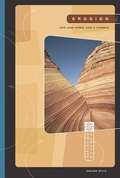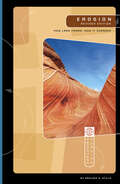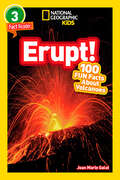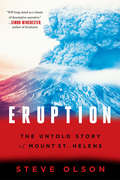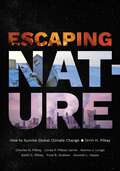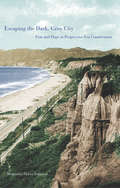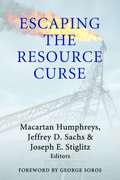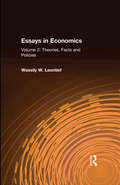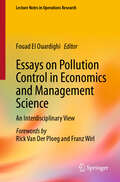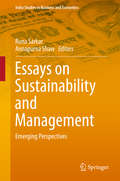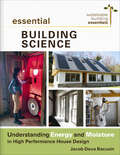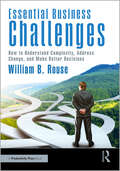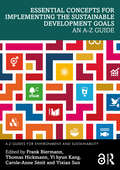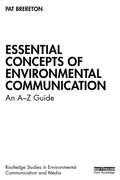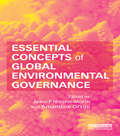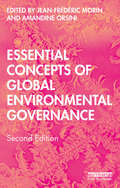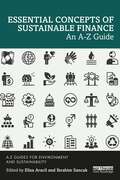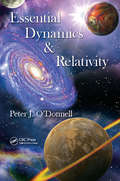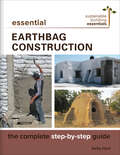- Table View
- List View
Erosion: How Land Forms, How It Changes
by Darlene R. StilleErosion is constantly changing, creating, and erasing features on Earth's surface. The issue of erosion is complex. By learning more about it, we understand when and how to prevent erosion and when to let this powerful force of nature do its work alone.
Erosion: How Land Forms, How It Changes (Exploring Science: Earth Science Ser.)
by Darlene R. StilleErste Schritte in die Theoretische Physik: Verständlich erklärt vom Abiturniveau aus
by Jürgen WagnerDieses Lehrbuch bietet einen einfachen Zugang zur Theoretischen Physik und realisiert einen durchgängigen Anschluss an die in der Schule erworbenen physikalisch-mathematischen Vorkenntnisse. Aus seiner Erfahrung als Diplomlehrer für Physik und Mathematik heraus ebnet der Autor den Weg in die Theoretische Physik. Er stützt sich dabei auf die folgenden Prinzipien: Viele Abbildungen und detailliert vorgerechnete Beispiele tragen wesentlich zum Verständnis der Darstellungen bei. Verwendete „Rechentricks“ werden angegeben und erläutert.Die erforderliche Mathematik wird schrittweise und ausführlich erarbeitet.Die Struktur des Lehrbuchs orientiert sich an folgenden zentralen Phänomenen und Grundbegriffen: Bewegung, Elektrizität und Magnetismus, Relativität sowie Quanten. In diesem Rahmen werden die üblichen Inhalte der Module Theoretische Mechanik, Elektrodynamik, Relativitätstheorie und Quantenmechanik verortet.Die experimentelle Basis für theoretische Ansätze wird explizit benannt, um die Besonderheiten der naturwissenschaftlichen Methode zu betonen, die sich von Autoritätsgläubigkeit sowie Spekulation deutlich abgrenzt.Auf bestehende Interpretationsprobleme der Quantenmechanik wird ausdrücklich hingewiesen. Begriffe wie „Welle-Teilchen-Dualismus“ oder „Kollaps der Wellenfunktion“ werden vermieden, da sie Missverständnisse provozieren können.Dieses Buch richtet sich an Studierende der Natur- und Ingenieurwissenschaften sowie des Lehramts, zu deren Studieninhalten mindestens ein Modul Theoretische Physik gehört. Es wendet sich auch an alle, die sich für Fragestellungen der Naturwissenschaften oder Naturphilosophie interessieren und über eine positive Einstellung zur Mathematik verfügen.
Erste Schritte in die Theoretische Physik: Verständlich erklärt vom Abiturniveau aus
by Jürgen WagnerDieses Lehrbuch bietet einen einfachen Zugang zur Theoretischen Physik und realisiert einen durchgängigen Anschluss an die in der Schule erworbenen physikalisch-mathematischen Vorkenntnisse. Aus seiner Erfahrung als Diplomlehrer für Physik und Mathematik heraus ebnet der Autor den Weg in die Theoretische Physik. Er stützt sich dabei auf die folgenden Prinzipien: Viele Abbildungen und detailliert vorgerechnete Beispiele tragen wesentlich zum Verständnis der Darstellungen bei. Verwendete „Rechentricks“ werden angegeben und erläutert.Die erforderliche Mathematik wird schrittweise und ausführlich erarbeitet.Die Struktur des Lehrbuchs orientiert sich an folgenden zentralen Phänomenen und Grundbegriffen: Bewegung, Elektrizität und Magnetismus, Relativität sowie Quanten. In diesem Rahmen werden die üblichen Inhalte der Module Theoretische Mechanik, Elektrodynamik, Relativitätstheorie und Quantenmechanik verortet.Die experimentelle Basis für theoretische Ansätze wird explizit benannt, um die Besonderheiten der naturwissenschaftlichen Methode zu betonen, die sich von Autoritätsgläubigkeit sowie Spekulation deutlich abgrenzt.Auf bestehende Interpretationsprobleme der Quantenmechanik wird ausdrücklich hingewiesen. Begriffe wie „Welle-Teilchen-Dualismus“ oder „Kollaps der Wellenfunktion“ werden vermieden, da sie Missverständnisse provozieren können.Dieses Buch richtet sich an Studierende der Natur- und Ingenieurwissenschaften sowie des Lehramts, zu deren Studieninhalten mindestens ein Modul Theoretische Physik gehört. Es wendet sich auch an alle, die sich für Fragestellungen der Naturwissenschaften oder Naturphilosophie interessieren und über eine positive Einstellung zur Mathematik verfügen.Die vorliegende zweite Auflage wurde um ein Kapitel zum Phänomen Wärme mit Inhalten aus der klassischen und statistischen Thermodynamik erweitert sowie an zahlreichen Stellen ergänzt und verbessert.
Erupt!: 100 Fun Facts About Volcanoes (National Geographic Kids Readers)
by Joan Marie GalatKids will burst with excitement as they learn all about the science and wonder of volcanoes in this new National Geographic Kids Reader. The Level 3 text provides accessible, yet wide-ranging information for fluent readers. Plus, the book includes 100 fun facts for quick and quirky information on all kinds of volcanoes, all around the world--and even some that are out of this world! The Facts Readers series bridges the gap between short, digestible knowledge nuggets and informative sustained reading.
Eruption!: Volcanoes And The Science Of Saving Lives (Scientists in the Field)
by Elizabeth Rusch Tom Uhlman“At 11:35 p.m., as Radio Armero played cheerful music, a towering wave of mud and rocks bulldozed through the village, roaring like a squadron of fighter jets.” Twenty-three thousand people died in the 1985 eruption of Colombia’s Nevado del Ruiz. Today, more than one billion people worldwide live in volcanic danger zones. In this riveting nonfiction book—filled with spectacular photographs and sidebars—Rusch reveals the perilous, adrenaline-fueled, life-saving work of an international volcano crisis team (VDAP) and the sleeping giants they study, from Colombia to the Philippines, from Chile to Indonesia.
Eruption: The Untold Story of Mount St. Helens
by Steve OlsonSurvival narrative meets scientific, natural, and social history in the riveting story of a volcanic disaster. For months in early 1980, scientists, journalists, sightseers, and nearby residents listened anxiously to rumblings in Mount St. Helens, part of the chain of western volcanoes fueled by the 700-mile-long Cascadia fault. Still, no one was prepared when an immense eruption took the top off of the mountain and laid waste to hundreds of square miles of verdant forests in southwestern Washington State. The eruption was one of the largest in human history, deposited ash in eleven U.S. states and five Canadian provinces, and caused more than one billion dollars in damage. It killed fifty-seven people, some as far as thirteen miles away from the volcano’s summit. Shedding new light on the cataclysm, author Steve Olson interweaves the history and science behind this event with page-turning accounts of what happened to those who lived and those who died. Powerful economic and historical forces influenced the fates of those around the volcano that sunny Sunday morning, including the construction of the nation’s railroads, the harvest of a continent’s vast forests, and the protection of America’s treasured public lands. The eruption of Mount St. Helens revealed how the past is constantly present in the lives of us all. At the same time, it transformed volcanic science, the study of environmental resilience, and, ultimately, our perceptions of what it will take to survive on an increasingly dangerous planet. Rich with vivid personal stories of lumber tycoons, loggers, volcanologists, and conservationists, Eruption delivers a spellbinding narrative built from the testimonies of those closest to the disaster, and an epic tale of our fraught relationship with the natural world.
Eruptions that Shook the World
by Clive OppenheimerWhat does it take for a volcanic eruption to really shake the world? Did volcanic eruptions extinguish the dinosaurs, or help humans to evolve, only to decimate their populations with a super-eruption 73,000 years ago? Did they contribute to the ebb and flow of ancient empires, the French Revolution and the rise of fascism in Europe in the 19th century? These are some of the claims made for volcanic cataclysm. Volcanologist Clive Oppenheimer explores rich geological, historical, archaeological and palaeoenvironmental records (such as ice cores and tree rings) to tell the stories behind some of the greatest volcanic events of the past quarter of a billion years. He shows how a forensic approach to volcanology reveals the richness and complexity behind cause and effect, and argues that important lessons for future catastrophe risk management can be drawn from understanding events that took place even at the dawn of human origins.
Escaping Nature: How to Survive Global Climate Change
by Orrin H. Pilkey Keith C. Pilkey Norma J. Longo Hannah L. Hayes Charles O. Pilkey Linda P. Pilkey-Jarvis Fred B. DodsonIndustrial and agricultural greenhouse gas emissions are rapidly warming Earth’s climate, unleashing rising seas, ocean acidification, melting permafrost, powerful storms, wildfires, floods, deadly heat waves, droughts, tsunamis, food shortages, and armed conflict over shrinking water supplies while reducing nutritional levels in crops. Billions of people will become climate refugees. Hotter temperatures will allow tropical diseases to spread into temperate regions. Higher levels of CO2, allergens, dust, and other particulate matter will impair our physical and mental health and even reduce our cognitive abilities. Climate change disproportionately affects the world’s poor. It also harms Nature, and could ultimately trigger a sixth mass extinction. In Escaping Nature, Orrin H. Pilkey and his coauthors offer concrete suggestions for how to respond to the threats posed by global climate change. They argue that while we wait for the world’s governments to get serious about mitigating climate change we can adapt to a hotter world through technological innovations, behavioral changes, nature-based solutions, political changes, and education.
Escaping the Dark, Gray City: Fear and Hope in Progressive-Era Conservation
by Benjamin Heber JohnsonA compelling and long-overdue exploration of the Progressive-era conservation movement, and its lasting effects on American culture, politics, and contemporary environmentalism The turn of the twentieth century caught America at a crossroads, shaking the dust from a bygone era and hurtling toward the promises of modernity. Factories, railroads, banks, and oil fields—all reshaped the American landscape and people. In the gulf between growing wealth and the ills of an urbanizing nation, the spirit of Progressivism emerged. Promising a return to democracy and a check on concentrated wealth, Progressives confronted this changing relationship to the environment—not only in the countryside but also in dense industrial cities and leafy suburbs. Drawing on extensive work in urban history and Progressive politics, Benjamin Heber Johnson weaves together environmental history, material culture, and politics to reveal the successes and failures of the conservation movement and its lasting legacy. By following the efforts of a broad range of people and groups—women’s clubs, labor advocates, architects, and politicians—Johnson shows how conservation embodied the ideals of Progressivism, ultimately becoming one of its most important legacies.
Escaping the Resource Curse (Initiative for Policy Dialogue at Columbia: Challenges in Development and Globalization)
by Jeffrey D. Sachs Joseph E. Stiglitz Eds. Humphreys MacartanThe wealth derived from natural resources can have a tremendous impact on the economics and politics of producing countries. In the last quarter century, we have seen the surprising and sobering consequences of this wealth, producing what is now known as the "resource curse." Countries with large endowments of natural resources, such as oil and gas, often do worse than their poorer neighbors. Their resource wealth frequently leads to lower growth rates, greater volatility, more corruption, and, in extreme cases, devastating civil wars. In this volume, leading economists, lawyers, and political scientists address the fundamental channels generated by this wealth and examine the major decisions a country must make when faced with an abundance of a natural resource. They identify such problems as asymmetric bargaining power, limited access to information, the failure to engage in long-term planning, weak institutional structures, and missing mechanisms of accountability. They also provide a series of solutions, including recommendations for contracting with oil companies and allocating revenue; guidelines for negotiators; models for optimal auctions; and strategies to strengthen state-society linkages and public accountability. The contributors show that solutions to the resource curse do exist; yet, institutional innovations are necessary to align the incentives of key domestic and international actors, and this requires fundamental political changes and much greater levels of transparency than currently exist. It is becoming increasingly clear that past policies have not provided the benefits they promised. Escaping the Resource Curse lays out a path for radically improving the management of the world's natural resources.
Escapism
by Yi-Fu TuanAcclaimed cultural geographer Yi-Fu Tuan considers humanity's enduring desire to escape reality— and embrace alternatives such as love, culture, and DisneyworldIn prehistoric times, our ancestors began building shelters and planting crops in order to escape from nature's harsh realities. Today, we flee urban dangers for the safer, reconfigured world of suburban lawns and parks. According to geographer Yi-Fu Tuan, people have always sought to escape in one way or another, sometimes foolishly, often creatively and ingeniously. Glass-tower cities, suburbs, shopping malls, Disneyland—all are among the most recent monuments in our efforts to escape the constraints and uncertainties of life—ultimately, those imposed by nature. "What cultural product," Tuan asks, "is not escape?" In his new book, the capstone of a celebrated career, Tuan shows that escapism is an inescapable component of human thought and culture.
Essays in Economics: Theories, Theorizing, Facts And Policies
by Wassily W. LeontiefFirst Published in 2015. Routledge is an imprint of Taylor & Francis, an Informa company.
Essays on Pollution Control in Economics and Management Science: An Interdisciplinary View (Lecture Notes in Operations Research)
by Fouad El OuardighiThe book features contributions that address both environmental economics and environmental management. It presents a novel dynamic modeling framework for environmental economics in which environmental absorption efficiency is considered as a time-dependent variable with its own dynamics. It also introduces several extensions and applications of the model, including the possibility of including self-regenerating environmental absorption efficiency, non-cooperative transboundary issues with two superimposed free-rider behaviors (i.e., emissions reduction and restoration efforts), and deforestation. In the environmental management context, it puts forward an entirely new dynamic modeling framework. Unlike static approaches, the model considers both flow and stock variables, reflecting the accumulation of pollution over time. In turn, the book assesses sustainable configurations for supply chain competition, providing mathematical insights and managerial recommendations that integrate accumulated pollution aspects and associated negative externalities. Overall, the book calls for combining environmental economics and environmental management in order to arrive at more realistic, empirically grounded models. Given its focus, the book offers a valuable resource for researchers and graduate students with an interest in addressing pollution control challenges in the fields of economics and management science.
Essays on Sustainability and Management
by Runa Sarkar Annapurna ShawThis book offers a comprehensive overview of sustainability and management in India and through its insightful essays highlights the complex and multifaceted nature of sustainability as a concept. It also demonstrates the debates surrounding the concept of sustainability and its ramifications for ground-level practice in managing organisations and for public policy. The contributions from sustainability enthusiasts, practitioners from disparate fields and academics working at the Indian Institute of Management Calcutta, have been divided into five themes: (1) sustainability as a normative concept; (2) sustainability concept at the global level, (3) sustainability practices in Indian organisations and consumer behaviour; (4) sustainability, corporate governance and corporate social responsibility and (5) sustainability: a critique of organisational practice and government regulation. The themes reflect both new and continuing issues confronting management in the country today. Examples and in-depth studies make it relevant to the grounded reality in India. The expertise and experience of the contributors ensure that readers are left with a grasp of our current understanding of how sustainability is related to society and business, the direction this understanding will take in the future.
Essential Building Science: Understanding Energy and Moisture in High Performance House Design (Sustainable Building Essentials)
by Jacob Deva RacusinDown and dirty – a complete step-by-step guide to making, installing and living with beautiful, all-natural earthen floors Poor heat and moisture management are the enemies of durable, comfortable, and efficient housing, and good building design and construction starts with a solid understanding of good building science. Essential Building Science provides a highly visual and accessible introduction to the fundamentals of building science for residential construction.Part one covers the rationale behind high-performance design and the fundamentals of building physics, including thermal dynamics, moisture transfer, and hygro-thermal dynamics such as vapor drive and condensation.Part two teaches the vital critical thinking skills needed to consider buildings as whole systems and to develop thermal and moisture control strategies regardless of the specifics of the design. Case studies and examples from across North American climatic zones illuminate real-life problems and offer builders, designers, and DIYers the insights and tools required for creating better new buildings and dramatically improving old ones.Good science plus critical thinking equals high performance buildings.
Essential Business Challenges: How to Understand Complexity, Address Change, and Make Better Decisions
by William B. RouseSociety seems increasingly complex, in part due to constant “breaking news,” likes, tweets, etc. Considerable change is being entertained, or at least debated. Significant decisions are required. Decision-making lately has been flawed, laced with contention, hesitancy, and poor outcomes.The author has long helped clients and sponsors to understand complexity, address needs for change, formulate plans, and make decisions to invest resources to execute these plans. His engagement with them has focused on formulating problems, devising possible solutions, and deciding which solutions merited investment.This book represents the author's reflections on these engagements, associated challenges, and typical outcomes. These stories are reports about clients' or sponsors’ problems and how he and his colleagues went about addressing these problems of complexity, change, and decision-making. The clients or customers for these services included over 100 enterprises in industry, government, and academia. Most were large, many in the US, but quite a few were in Europe, Asia, Africa, and Latin America. Geography mattered in these engagements but did not dominate.The chapters in this book represent his reports on what he learned, and what he could generalize across airplanes, automobiles, banking, computers, communications, insurance, pharmaceuticals, retail, satellites, semiconductors, and telecoms, working with stakeholders from companies, agencies, and academia.
Essential Classical Thermodynamics (SpringerBriefs in Physics)
by Ulf W. GeddeThis book is a concise, readable, yet authoritative primer of basic classic thermodynamics. Many students have difficulty with thermodynamics, and find at some stage of their careers in academia or industry that they have forgotten what they learned, or never really understood these fundamental physical laws. As the title of the book suggests, the author has distilled the subject down to its essentials, using many simple and clear illustrations, instructive examples, and key equations and simple derivations to elucidate concepts. Based on many years of teaching experience at the undergraduate and graduate levels, “Essential Classical Thermodynamics” is intended to provide a positive learning experience, and to empower the reader to explore the many possibilities for applying thermodynamics in other fields of science, engineering, and even economics where energy plays a central role. Thermodynamics is fun when you understand it!
Essential Concepts for Implementing the Sustainable Development Goals: An A-Z Guide (A-Z Guides for Environment and Sustainability)
by Frank Biermann Thomas Hickmann Yixian Sun Carole-Anne Sénit Yi Hyun KangThis book provides a highly accessible and user-friendly overview of the essential concepts and terms related to the current global endeavour to implement the Sustainable Development Goals.With the first decade of the 15-year timespan of the 2030 Agenda now past, the SDGs show limited progress and several goals are even regressing. It is imperative that SDG implementation is accelerated until 2030 and beyond to foster transformations and set the world onto a sustainable and resilient path. The book starts with a thematic introduction to contextualize the topic and set the stage for the individual entries. It then follows an A-Z format, with over 100 entries which describe an important concept or term, using practical examples to illustrate how it connects to the overall debate about sustainable development. It offers swift introductions to key concepts and terms that are discussed and explained by scholarly and policy experts from around the world in a concise and user-friendly way.The guide is comprehensive in scope, practically oriented and focused on political and societal processes to drive change on a larger scale. With cross-references to related terms in the entries, this book will be a highly valuable resource for students and practitioners engaged with the SDGs and sustainable development more broadly.
Essential Concepts of Environmental Communication: An A–Z Guide (Routledge Studies in Environmental Communication and Media)
by Pat BreretonThis book draws on a broad spectrum of environmental communications and related cross-disciplinary literature to help students and scholars grasp the interconnecting key concepts within this ever-expanding field of study. Aligning climate change and environmental learning through media and communications, particularly taking into account the post-COVID challenge of sustainability, remains one of the most important concerns within environmental communications. Addressing this challenge, Essential Concepts for Environmental Communication synthesises summary writings from a broad range of environmental theorists, while teasing out provocative concepts and key ideas that frame this evolving, multi-disciplinary field. Each entry maps out an important concept or environmental idea and illustrates how it relates more broadly across the growing field of environmental communication debates. Included in this volume is a full section dedicated to exploring what environmental communication might look like in a post-COVID setting: • Offers cutting-edge analysis of the current state of environmental communications. • Presents an up-to-date exploration of environmental and sustainable development models at a local and global level. • Provides an in-depth exploration of key concepts across the ever-expanding environmental communications field. • Examines the interaction between environmental and media communications at all levels. • Provides a critical review of contemporary environmental communications literature and scholarship. With key bibliographical references and further reading included alongside the entries, this innovative and accessible volume will be of great interest to students, scholars and practitioners alike.
Essential Concepts of Global Environmental Governance
by Jean-Frederic Morin Amandine OrsiniAligning global governance to the challenges of sustainability is one of the most urgent environmental issues to be addressed. This book is a timely and up-to-date compilation of the main pieces of the global environmental governance puzzle. The book is comprised of 101 entries, each defining a central concept in global environmental governance, presenting its historical evolution, introducing related debates and including key bibliographical references and further reading. The entries combine analytical rigour with empirical description. The book: offers cutting edge analysis of the state of global environmental governance, raises an up-to-date debate on global governance for sustainable development, gives an in-depth exploration of current international architecture of global environmental governance, examines the interaction between environmental politics and other fields of governance such as trade, development and security, elaborates a critical review of the recent literature in global environmental governance. This unique work synthesizes writing from an internationally diverse range of well-known experts in the field of global environmental governance. Innovative thinking and high-profile expertise come together to create a volume that is accessible to students, scholars and practitioners alike.
Essential Concepts of Global Environmental Governance
by Jean-Frédéric MorinAligning global governance to the challenges of sustainability is one of the most urgent international issues to be addressed. This book is a timely and up-to-date compilation of the main pieces of the global environmental governance puzzle. Essential Concepts of Global Environmental Governance synthesizes writing from an internationally diverse range of well-known experts. Each entry defines a central concept in global environmental governance, presents its historical evolution and related debates, and includes key bibliographical references. This new edition takes stock of several recent developments in global environmental politics including the 2015 Paris Agreement on Climate Change, the UN Global Pact for the Environment attempt in 2017, and the 2018 Oceans Plastics Charter. More precisely, this book: offers cutting-edge analysis of the state of global environmental governance; presents an up-to-date debate on sustainable development at the global level; gives an in-depth exploration of current architecture of global environmental governance; examines the interaction between environmental politics and other policy fields such as trade, development, and security; provides a critical review of the recent global environmental governance literature. Innovative thinking and high-profile expertise come together to create a volume that is accessible to students, scholars, and practitioners alike.
Essential Concepts of Sustainable Finance: An A-Z Guide (A-Z Guides for Environment and Sustainability)
by Elisa Aracil Ibrahim SancakThis book compiles and explains technical terms in sustainable finance in an easy-to-navigate A-Z format. The interdisciplinary nature of sustainable finance means that those researching and working in the field often have to turn to a variety of different sources to look up various non-financial terms. Recognizing this issue, Ibrahim Sancak and Elisa Aracil have curated a comprehensive list of the key terms most commonly used in the field. Each entry maps out an important concept or idea and illustrates how it relates more broadly across this growing discipline, such as the changes and innovations required by the financial sector to meet the United Nation’s Sustainable Development Goals. Overall, Essential Concepts of Sustainable Finance will enable readers to communicate more effectively about finance within the context of sustainability. With related terms and further reading included alongside the entries, this innovative and accessible volume will be of great interest to students, scholars, and practitioners alike.
Essential Dynamics and Relativity
by Peter J. O'DonnellEssential Dynamics & Relativity provides students with an introduction to the core aspects of dynamics and special relativity. The author reiterates important ideas and terms throughout and covers concepts that are often missing from other textbooks at this level. He also places each topic within the wider constructs of the theory, without jump
Essential Earthbag Construction: The Complete Step-by-Step Guide (Sustainable Building Essentials)
by Kelly Hart&“A must-have book for anyone interested in natural and sustainable building. It expands the possibilities with practical and essential information.&” —Will Beemer, Director of the Heartwood School for the Homebuilding Crafts and author of Learn to Timber Frame. Build economical and resilient earthbag structures using simple tools and techniques. Earthbag construction—building with polypropylene bags usually filled with earthen materials—is a versatile, easy-to-master, low-impact, and highly durable form of building, suitable for structures from houses to root cellars. Containing over seventy-five photos and illustrations, Essential Earthbag Construction is a practical guide to this affordable method of building. Going well beyond the scope of other sources, this indispensable manual is packed with all the information you need to determine if it&’s the right choice for your project, and to start building. Distilling decades of experience, research, and best practices, it covers: Material specifications, performance, and when and where to use it Pros and cons of different fills from gravel, to earth and clay, to insulative perlite, rice hulls, and volcanic stone Illustrated, step-by-step guidance for efficient bag filling and installation Details for various designs, including domes and arches Foundation options and seismic and stability considerations Finishing and maintenance techniques Tools and materials Additional resources. Essential Earthbag Construction presents the practical guidance and best practices for both the DIYer and professional to design and build high-quality earthbag structures. &“A comprehensive, practical and inspirational guide that is both detailed and easy to follow.&” —Jenny Pickerill, Professor of Environmental Geography, University of Sheffield, UK and author of Eco-Homes: People, Place and Politics &“Everything you need to know for success.&” —Michael G. Smith, co-editor, The Art of Natural Building and co-author, The Hand-Sculpted House
